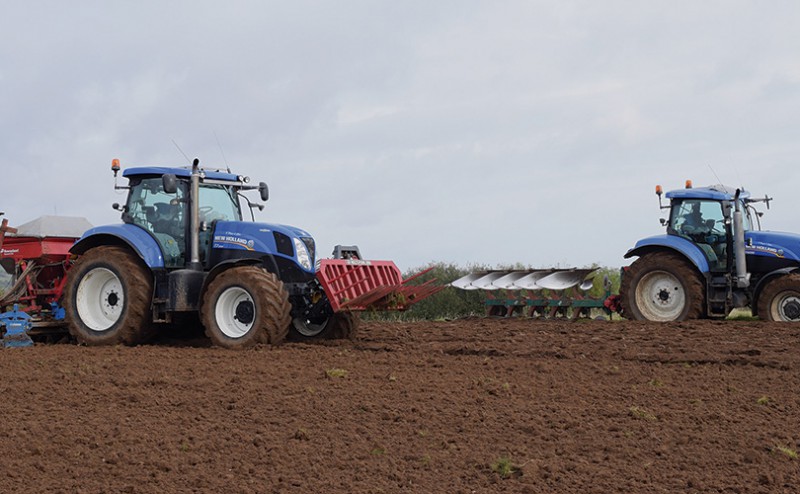
The Boyes family have been in dairy for nearly a century. Last year, they took the decision to milk their 350-strong Pennygate Herd three times a day, which has resulted in increased milk yield and an improvement in the overall health of the herd.
The Boyes’ have been milking cows in Moira since 1921 when Joseph Boyes bought a farm close to the village where counties Down, Armagh and Antrim all meet. Joseph’s son Edward, who died aged 90 in 2006, ran the farm for many years before passing it down to his sons Raymond, William and current owner Kenneth. The enterprise still trades as E Boyes & Sons.
Kenneth farms full time alongside his wife Linda and two of their sons Richard and Andrew with one other full time employee. His other children Philip, Emma and Jacqui and daughter-in-law Suzanne help out when required. Currently, Kenneth farms 230 acres of his own and a further 600 acres in rented land. Calving is all year round and all young stock is reared. Heifers are kept as replacements and the bulls are reared for beef.
The family’s sizeable herd of Holstein Friesian and Dairy Shorthorns are milked thrice daily, at 6am, 2pm and again at 10pm. The milking duties are shared between the family members and friends.
“We’ve been milking cows every year since 1921 with the exception of 1958 when we lost the herd to TB,” Kenneth explains.
“We recovered from that and built the herd back up to 40 within a couple of years. Throughout the years we have steadily increased the size of the herd to its present figure of 350. The herd is divided evenly between Dairy Shorthorn and Holstein. We rear all our own stock and grow about 100 acres of both wheat and barley; and a further 100 acres of maize, the bulk of which we keep as feedstuff. We try to be as self-sufficient as possible.”
E Boyes & Sons produces approximately 3 million litres of milk per year – the average yield of each cow is 8,500 litres – which is supplied to the Lakeland Dairies-owned Pritchitt’s in Newtownards. The Lakeland Dairies Group is one of Ireland’s largest farmer-owned dairy cooperatives. On a daily basis, fresh milk is collected from over 2,200 family farms, operating with a 15-county catchment area. From these lush pastures, Lakeland Dairies’ products reach over 70 countries worldwide.
The Group has grown into a global market leader in the manufacturing of dairy-based products. Its foodservice products are developed with the professional in mind, delivering high-quality, yet functional products to busy kitchens and bakeries around the world.
The Pennygate Herd is milked in a state-of-the-art Dairymaster Rapid Exit 30/60 parlour which was installed in 2008. The 30-unit parlour – the first of its kind in the country – can milk 350 cows in less than two hours with two operators being present for milking.
With the installation of his new parlour, Kenneth decided to include Auto ID and Milk Metres which he finds very useful as it allows him the see the volume of milk produced by each animal at a glance. He also opted for Automatic Cluster Removers which he has stated are extremely efficient as they prevent over or under milking of cows and it also saves a job in the pit. The installation of an AutoWasher and Drafting and VoiceAssist (parlour sound messaging system) has also reduced the workload for the affable dairy farmer.
The Boyes’ also installed a diversion line which feeds directly into the calves housing, saving them the labour intensive task of carrying buckets around the farm. The diversion line also proves very effective by enabling all of the cows to be milked together, therefore reducing the need to separate a specific cow to wait until the end.
Furthermore a Swiftflo Plus bailing system was installed, which allows each row of cows to exit the parlour quickly. A feeding facility ensures the cows get what they require, as they feed to yield and thus leads to a more content cow in the parlour and assists in the training process of heifers.
Kenneth has discovered that there are more pros than cons to milking his herd three times a day.
“Our daily milk production has increased significantly since we went from milking twice a day last year,” he says.
“We also find that the cows are more content and are less likely to suffer from mastitis. We had the extra space and facilities, so we decided it was worth a try. As we had just purchased a neighbouring farm, we realised that by milking three times a day, we could help to ease the financial burden associated with this.”
On the other hand, he added “The downside to milking three times a day is that it is much more labour intensive and you’re milking at unsociable times. But so far, the positive impact on our business had made it worthwhile.”
Like all dairy farmers, Kenneth is struggling to cope with the collapse in milk prices.
“Milk prices are at their lowest since 1968, so you can understand why so many farmers are struggling. There is an oversupply of milk on the global market at present and things won’t improve until that is rectified. Prices have always fluctuated, but I fear it will take longer than usual for them to recover this time around.”
Let’s hope for everyone’s sake that they recover soon.
E Boyes & Sons
23A Halfpenny Gate Road,
Moira,
Co. Armagh BT670HW
Telephone: 077 03497919
Email: [email protected]
Taken from Irish Tractor & Agri magazine Vol 4 No 1, January 2016